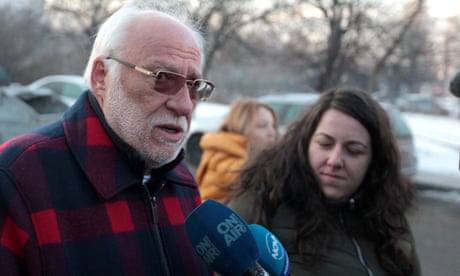As more stories like this continue to emerge, it will likely further depress Russian army recruiting efforts. JL
Pjotr Sauer reports in The Guardian:
A group of Russian soldiers have accused their commanders of jailing them in eastern Ukraine for refusing to take part in the war, in a rare public exposure of tensions inside the ranks of Russia’s army over the invasion.“We already have a list of 70 Russian soldiers who were held as prisoners. In total, about 140 soldiers were held,” added Maxim Grebenyuk, who represented the soldiers. They were guarded there by members of the private military firm Wagner and were fed once a day.A group of Russian soldiers have accused their commanders of jailing them in eastern Ukraine for refusing to take part in the war, in a rare public exposure of tensions inside the ranks of Russia’s army over the invasion.
Maxim Grebenyuk, a lawyer who runs the Moscow-based advocacy organisation Military Ombudsman, said at least four Russian soldiers had filed written complaints with the investigative committee, demanding punishment for the superiors who oversaw their detainment.
“We already have a list of 70 Russian soldiers who were held as prisoners. In total, about 140 soldiers were held,” added Grebenyuk, who represented the soldiers.
In one written testimony sent to Russian prosecutors on 1 August and reviewed by the Guardian, a soldier described how, after refusing to return to the battlefield, he was jailed for more than a week in different cells in the Russian-controlled territory of Luhansk.
“As a result of what I believe were tactical and strategic mistakes made by my commanders … and their total disregard for human life … I made the decision not to continue in the military operation,” said Vladimir, a soldier whose name has been changed at his request.
Vladimir said he was detained on 19 July and placed in a room with window bars where he was held without food with 25 other soldiers from his unit who also refused to fight.
Shortly after, Vladimir said he was transferred to the town of Bryansk in Luhansk, where he was held in a former school, which had been turned into a military base with about 80 other soldiers from different units who had similarly refused to continue participating in the invasion.
He said they were guarded there by members of the private military firm Wagner, a notorious organisation that has been accused of committing human rights abuses while fighting alongside the Russian military in Ukraine.
“They [Wagner soldiers] told us that mines had been placed outside the military base and that whoever tried to flee would be considered an enemy and shot on the spot,” the soldier wrote.
“We were fed once a day at lunchtime. There was no basic hygiene.
“The whole time, not a single document was provided that would explain our arrest. We were illegally jailed,” Vladimir wrote, asking the prosecutors to start a criminal investigation into two Russian colonels and a major who he said were responsible for his jailing.
Russia’s defence ministry did not respond to the Guardian’s questions for this article.
Vladimir said he eventually managed to leave the premises after a military doctor recommended he should be hospitalised for injuries he sustained earlier in the war.
It was not immediately clear if other Russian soldiers were still being held in Luhansk.
The jailing of the soldiers, which was first reported last week by the independent investigative outlet the Insider, adds to the growing evidence that some Russian units in Ukraine continue to be plagued by low morale and infighting.
A number of Russian court documents previously revealed that hundreds of soldiers have been fired for refusing to take part in the invasion.
But the written complaints are the first official testaments that shed light on the more severe punishments faced by those who refuse to fight in Ukraine.
The Kremlin has not formally declared war, meaning contract soldiers who opt against fighting can face dismissal but cannot be prosecuted or jailed, said Mikhail Benyash, a lawyer who has in the past represented soldiers who refused orders to go to Ukraine.
Pointing to that fact, Vladimir wrote: “Military personnel can be deprived of their liberty only in cases strictly specified in Russian law, namely when they are believed to have committed a crime.”
The soldier’s jailing also points to Russia’s growing problems with troop availability as the war nears its sixth month.
Vladimir said that during his imprisonment, commanders would repeatedly put pressure on soldiers, urging them to change their minds and return to the battlefield.
“Some soldiers, under the threat of violence, were simply driven out to unknown destinations, they have not been seen since,” he wrote.
Western intelligence has argued that Russia will soon exhaust its combat capabilities and be forced to bring its offensive in Ukraine to a halt.
Russia, which has decided against declaring a general mobilisation, has intensified its efforts to recruit new soldiers.
But despite that recruitment push, Richard Moore, chief of the UK’s Secret Intelligence Service (SIS), said last week that Moscow was “about to run out of steam” in Ukraine.
“I think our assessment is that the Russians will increasingly find it difficult to supply manpower material over the next few weeks,” he said.





















0 comments:
Post a Comment